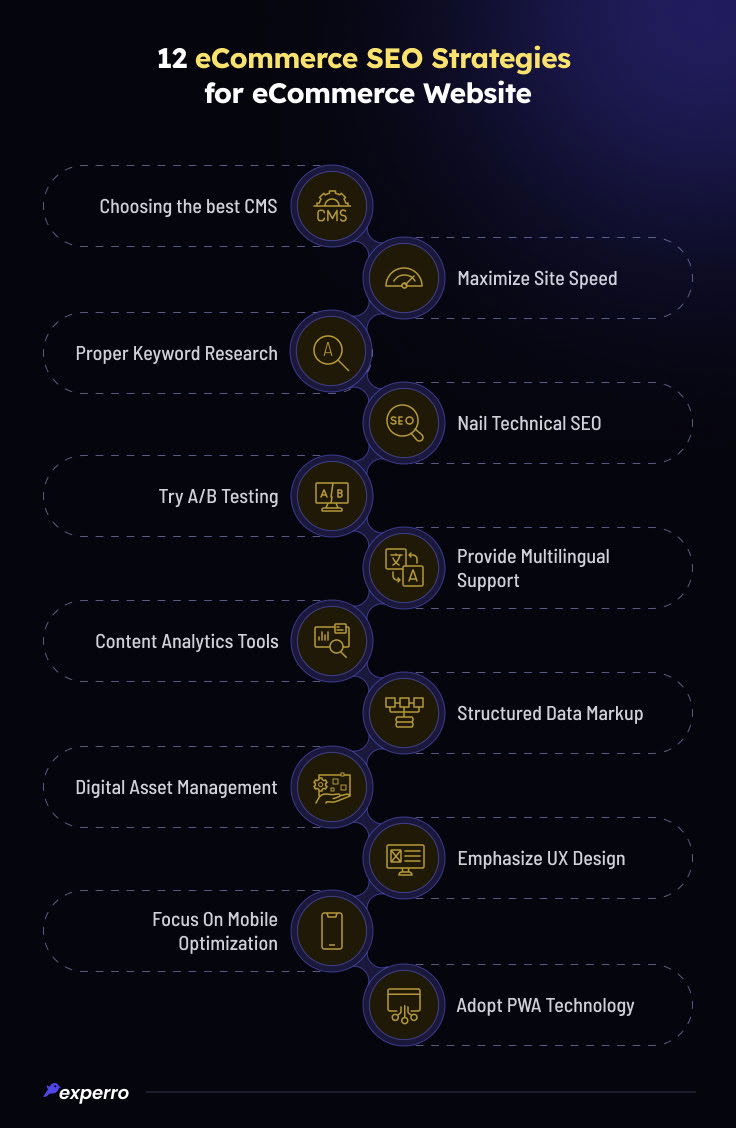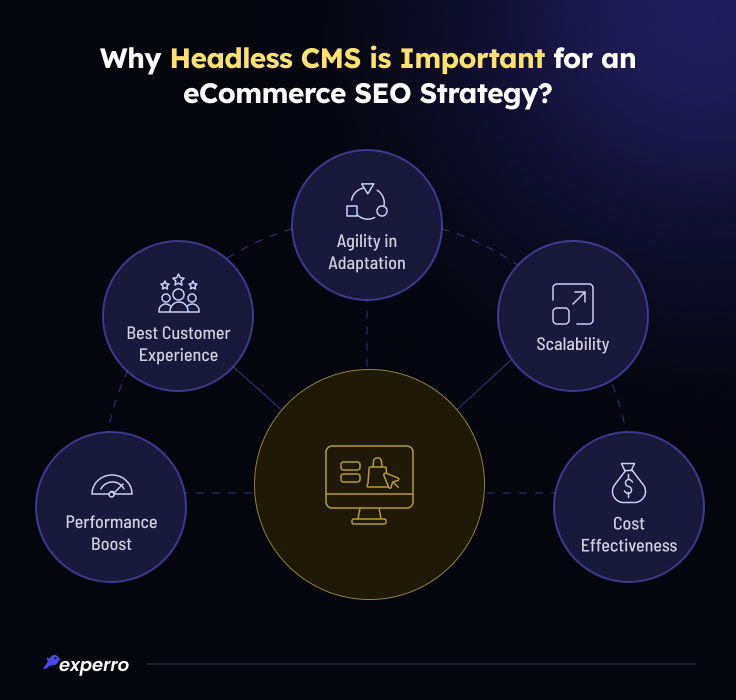Mastering eCommerce SEO Strategy: 12 Key Strategies for 2025

What’s Inside
- Why Is SEO Important for eCommerce Websites?
- Top 12 SEO Strategies for eCommerce Website
- Boost Your eCommerce SEO Strategy with Experro’s Headless CMS Approach
- Dive into the future of eCommerce with a headless storefront!
- How Does Experro Align with eCommerce SEO Strategies?
- Why Does Experro Stand Out in the DXP Market?
- Do you wish to transform your eCommerce Journey with a complete DXP?
- Conclusion
key Takeaways
- An eCommerce SEO strategy ensures a user-friendly experience, promoting ease of navigation and increased engagement.
- The discussed SEO strategy is scalable, supporting future expansion and ensuring sustained visibility and growth in organic search rankings.
- Experro serves as a comprehensive Digital Experience Platform (DXP). It seamlessly integrates with popular CMS options, optimizing site speed, simplifying A/B testing, and providing advanced content analytics.
- Experro's eCommerce SEO strategies ensure a top-notch user experience, optimizing engagement and satisfaction.
Are you finding it challenging to run a well-optimized eCommerce website?
Don't worry, as in the vast realm of eCommerce, navigating the correct DXPs to build and optimize your website can be complex. With the right DXP and an eCommerce SEO strategy, your online store can stand out from the competition.
Numbers don't lie – As per Statista, the total value of eCommerce sales skyrocketed from $1.3 trillion in 2014 to $5.7 trillion in 2022.
And guess what?
The forecast for the years to come is incredibly mind-blowing. Statista predicts that by 2026, the total sales in the eCommerce realm will hit an impressive $8 trillion approximately
That's not just a trend; it's going to be a retail revolution.
Figuring out search engines, customer's search intent, and what they exactly want might feel a bit confusing. But don't worry!
We've got you covered with a list of 12 SEO strategies for eCommerce websites.
But before that, let’s have a quick look into the importance of SEO for eCommerce sites.
Why Is SEO Important for eCommerce Websites?
Implementing robust SEO strategies for eCommerce sites guides potential customers directly to your website.
Planning for a tailored SEO strategy for eCommerce is essential. Your product is unique, and your SEO approach should reflect that. It's about understanding your products, your target audience, and how they search online.
SEO optimizes your site to rank higher in search results, which is one of the main factors in directing users to your site and landing at your products when they search the same.
Why is learning about the best eCommerce SEO strategies WORTH IT?
It's the key to making your site visible and attracting more traffic, which can lead to increased sales and brand recognition. Your website deserves attention, and SEO is the tool that puts it on the digital map.
Now, you know the importance of SEO for eCommerce so let's delve deeper into the top 12 enterprise eCommerce SEO strategies.
Top 12 SEO Strategies for eCommerce Website

SEO for eCommerce is more than just adding keywords and link building. It involves understanding search engines, buyer intent, and changing algorithms.
You can enhance your site's visibility and performance by focusing on the best SEO practices and critical website areas.
Now, let's explore the key strategies for optimizing your eCommerce website for search engines.
1. Choose the Most Suitable CMS for eCommerce SEO
Selecting the right content management system is a critical decision that significantly impacts the effectiveness of your eCommerce SEO strategy.
A headless architecture stands out for its flexibility and efficiency among the various options available.
The separation allows for greater customization and control over how content is presented and managed. This makes it an excellent choice for tailoring the best SEO strategies for eCommerce.
A headless CMS also excels in supporting SEO plugin integration and streamlining sitemap creation.
Technical SEO stands out by efficiently managing broken links. Thereby it enhances user experience and boosts search engine rankings.
The headless architecture allows for quicker updates and modifications, which is essential in maintaining a healthy, SEO-friendly website.
Headless CMS and SEO work parallel to enhance your digital presence.
2. Maximize Site Speed for Improved User Engagement
Site speed is an essential aspect influencing both user experience and search engine rankings. It significantly impacts how users interact with your site and, consequently, their likelihood to convert.
To enhance site speed, start with comprehensive keyword research to understand what terms are driving search volume to your pages.
By optimizing your content for the right target keywords, you can improve the relevance of your site architecture and contribute to higher organic traffic.
A well-optimized category page and streamlined on-page elements contribute to faster loading time. Implementing a Content Delivery Network (CDN) is another vital step.
This strategic move ensures swift website loading not only across various devices but also in diverse geographic locations and a broader audience.
Regularly leverage these insights to continually fix your site's performance and maintain optimal loading times in search engine results pages. This, in turn, positively influences your site's ranking in search results.
3. Focus on Keyword Research & On-Page SEO
Effective eCommerce SEO includes comprehensive keyword research to understand user behavior. It is important to choose the target keyword and secondary keywords for your product pages.
Utilize Google Keyword Planner, SEMrush, and Ahrefs to understand keyword search volume and keyword difficulty insights and generate creative keyword ideas.
On-page optimization involves optimizing a category page and eCommerce product page based on the informational keywords actively searched by potential customers.
Understanding the search volume associated with your products and niche allows you to tailor your content to meet user intent effectively.
A keyword research strategy ensures that your eCommerce site aligns with user queries, enhancing its visibility in search results.
eCommerce category pages and meta descriptions on your site should contain the targeted keywords your customers seek. This aligns your website with key keywords, boosting visibility and attracting targeted traffic.
4. Optimize Technical SEO for Better Visibility
eCommerce technical SEO plays a pivotal role in digital commerce. To optimize your website, ensure you address issues such as broken links, slow page load speed, unoptimized images, and poor mobile responsiveness.
Additionally, avoid duplicate content to enhance the overall user experience and search engine ranking.
A seamless user experience requires a keen eye on the search results. Enhance your search engine results page appearance by utilizing the best eCommerce SEO tools that provide insights into your site performance.
Building internal links helps your website rank quickly. Internal links also play an important role in holding a customer's interest. Ensure that your product pages align with the user's search intent.
Effective technical SEO is crucial for a website to stay competitive in the crowded digital marketplace.
5. Implement A/B Testing for Data-Driven Decision Making
A/B testing is an iterative process that involves experimenting with different elements on your eCommerce site. It helps you determine what resonates best with your audience.
This involves variations in product descriptions, CTAs, and product page layouts.
Regularly conduct A/B tests and analyze results to refine your eCommerce site SEO strategy. Focus on elements leading to enhanced engagement, conversions, and search visibility through strategic optimization.
6. Ensure Multilingual Support for Global Reach
Expanding your eCommerce site's reach globally requires more than just language translation. It's crucial to consider each region's cultural differences and shopping behaviors.
Just be mindful of those nuances and user expectations in every target spot. It's about customizing the shopping experience to reflect each target market's cultural nuances and preferences.
Ensure users are directed to the most relevant content based on their location and language preference.
7. Use Content Analytics Tools for Insightful Analysis
Making use of content analytics tools is essential for understanding user behavior. It helps in making informed decisions about your e-commerce SEO strategy. Google Analytics provides valuable insights into website traffic, user demographics, and popular pages.
A well-informed approach to an eCommerce SEO campaign involves leveraging the power of content analytics tools like Moz Pro, Mixpanel, and Hotjar.
These tools empower you to find keywords that resonate with your audience, optimize your eCommerce product pages, and enhance the overall performance of the web pages on your site.
Utilizing these analytics tools empowers eCommerce businesses to adapt and refine their strategies, ultimately enhancing user experience and search engine visibility.
8. Apply Structured Data Markup for Better SEO
Adopt a creative asset management system for image organization and tagging. Implement features for descriptive keyword assignment and efficient search capabilities.
Give search engines more details to understand your content better. It increases the chances of appearing in featured snippets, knowledge panels, and other search result features.
This not only improves click-through rates. It also establishes your site architecture as a more authoritative source in your niche.
9. Integrate Digital Asset Management for Efficient Content Handling
Optimizing product images is crucial for both user experience and search engine visibility.
Implement a digital asset management system for organizing and tagging images. Use descriptive keywords to enhance the organization of the images in the system.
Integrating digital asset management practices ensures that your eCommerce product pages are well organized as you focus on refining your keyword rankings.
10. Embrace User Experience (UX) Design Principles
Use alt text to offer contextual information for search engines like Google. This enhances the accessibility of your product images to a broader audience.
Focus on clear navigation, intuitive design, and mobile responsiveness. Streamline the checkout process to minimize bounce rates and encourage users to explore more of your site.
Google considers user experience metrics such as page load times and bounce rates. These factors play a significant role in determining search rankings.
11. Focus on Mobile Optimization as a Priority
Mobile optimization is crucial as more users use eCommerce sites on their mobile devices. Prioritizing a seamless mobile experience is important. Ensure your website has a responsive design that adapts to various screen sizes.
Optimize images for mobile viewing and consider implementing Accelerated Mobile Pages (AMP). This helps you to provide a fast experience. Google's mobile-first indexing places significant importance on mobile-friendly websites when determining search rankings.
12. Adopt Progressive Web App (PWA) Technology for Seamless Accessibility
Progressive Web Apps (PWAs) offer a hybrid experience between web and mobile applications. It provides users with a seamless and app-like experience directly through their browsers.
Notably, eCommerce PWA enhances site performance, decrease bounce rates, and positively affect SEO rankings.
Your eCommerce site can engage users more effectively by implementing PWA technology. This leads to improved search engine visibility and a higher chance of converting visitors into customers.
The above strategies cover everything about an eCommerce strategy. However, adopting a headless CMS has unique considerations for an eCommerce website's SEO strategy.
Let’s explore more about the importance of headless eCommerce and how Experro aligns with your eCommerce strategy.
Boost Your eCommerce SEO Strategy with Experro’s Headless CMS Approach

In eCommerce, headless commerce is transforming businesses. This strategy separates the frontend and backend for enhanced flexibility and adaptability.
The benefits, from enhanced performance to improved customer experiences, are reshaping eCommerce SEO strategies.
Going headless can drive your SEO strategy to new heights by offering several benefits:
Performance Boost
Headless commerce solutions bring significant performance improvement to eCommerce platforms. The process entails decoupling the frontend and backend. This eliminates hindrances, enhancing overall efficiency.
By doing so, the system becomes more responsive, crucial for delivering a user-friendly experience. This enhanced performance positively contributes to your site's search engine optimization (SEO) ranking.
Customer Experience
Headless enables a personalized and seamless customer experience by recognizing the customer's search intent. The flexibility to use various frontend technologies empowers you.
Design unique, tailored interfaces for your audience. This personalized approach fosters trust and loyalty among customers. It contributes to a positive user journey, a key factor for search engine rankings.
Agility in Adaptation
In eCommerce, staying ahead of trends is crucial.
Headless architecture offers the agility to adapt to changes swiftly. This ensures your eCommerce platform stays relevant and appealing in the dynamic market. This adaptability extends to your eCommerce SEO strategy.
Headless enables swift optimization of content, related keywords, and other SEO elements. This alignment caters to emerging trends and customer demands effectively.
Scalability
As your eCommerce business grows, scalability becomes a critical factor.
Headless commerce solutions provide seamless scalability. This enables your platform to handle more traffic and transactions without compromising performance.
Choosing the best eCommerce platform for SEO is vital, as it impacts your site's scalability and search ranking.
Scalability is advantageous for SEO, facilitating efficient management of growth. Search engines prioritize websites that consistently deliver a positive user experience.
Cost-Effectiveness
Going headless results in cost savings on infrastructure and maintenance.
The ability to choose best-in-class solutions for both frontend and backend is integral. It enables optimal budget optimization for your business needs. This enables strategic resource allocation.
Going headless helps you to free up resources for other business areas and boost your eCommerce SEO practices with investments.
The cost-effectiveness of a headless approach is an essential contributor to overall efficiency. It streamlines digital marketing efforts, allowing for strategic resource allocation.
How Does Experro Align with eCommerce SEO Strategies?
In the fast-paced world of eCommerce, staying ahead with an effective SEO strategy is crucial. Experro is one of the best digital experience platforms, that transforms and elevates eCommerce SEO practices.
Let's explore how Experro aligns with and enhances the evolving landscape of SEO strategies.
1. Seamless Integration with Diverse CMS Options
Experro seamlessly integrates with popular CMS options such as Shopify and BigCommerce. This alignment ensures a perfect fit with your chosen eCommerce SEO strategy.
It offers versatility, catering to your priorities, whether customizing title tags or ensuring a clean URL structure for a blog post.
2. Site Speed Optimization
Recognizing the importance of site speed, Experro supports the implementation of a CDN. Swift website loading across devices and geographic locations is ensured by Experro. This is a critical factor impacting user experience and search engine rankings.
3. A/B Testing Simplified
Experro simplifies the A/B testing process. It allows for continuous improvement of your eCommerce site. It effortlessly experiments with various elements, including product descriptions and CTAs.
Experro refines your eCommerce SEO strategy based on real-time results derived from these experiments.
4. Global Reach with Multilingual Support
Expanding your eCommerce site globally requires understanding regional preferences. Experro's multilingual support extends beyond translation.
It empowers you to customize specific strategies for eCommerce SEO for diverse audiences in each region, ensuring effective communication.
5. Advanced Content Analytics
Experro enhances your SEO eCommerce strategy by providing advanced content analytics tools. Integrated with Google Analytics and Hotjar, Experro offers valuable insights into user behavior, demographics, and interactions.
These insights are crucial in aiding informed decision-making for your eCommerce SEO strategy.
Related Read
Insights you shouldn't miss out on about eCommerce Analytics.
6. Structured Data Markup for Enhanced Visibility
Experro helps you in image organization and tagging for enhanced efficiency. Utilize eCommerce keyword research tools and implement descriptive keyword features to improve search engine visibility.
This positions your eCommerce site as an authoritative source in your niche.
7. Image Optimization Simplified
Experro’s digital asset management streamlines the workflow, ensuring a seamless and efficient approach to image optimization.
Utilize descriptive keywords to organize and tag images with Experro, enhancing user experience. This strategic approach also ensures improved search engine visibility for your eCommerce site.
8. User Experience (UX) at the Forefront
Experro prioritizes user experience, incorporating alt text for contextual information and ensuring clear navigation.
Additionally, Experro is committed to mobile responsiveness, optimizing the user experience across various devices. Streamlined checkout processes contribute to reduced bounce rates and improved search rankings.
9. Mobile Optimization Excellence
Recognizing the increasing mobile user base, Experro prioritizes mobile optimization. Experro ensures a fast and mobile-friendly experience through responsive design and image optimization.
Additionally, its consideration of Accelerated Mobile Pages (AMP) aligns seamlessly with Google's mobile-first indexing.
10. Progressive Web App (PWA) Implementation
Experro takes eCommerce strategy to the next level by seamlessly implementing PWAs. It significantly contributes to improved search engine visibility and increased conversion rate. By enhancing site performance and providing an app-like experience.
On average, implementing a Progressive Web App (PWA) can result in a remarkable 63% improvement in website speed.
Why Does Experro Stand Out in the DXP Market?
Experro stands out from the competitors because of its unique features:
- Headless & Composable Frontend
- Headless CMS & API
- AI-Powered Product Discovery
- Visual Website Builder
- Centralized Content Hub
- Merchandising
- A/B Testing
- Activity Dashboard
- Alerts/Notifications
- Analytics
- Multiple Environments
- Search & Merch Insights
- Search APIs
- Versioning
Conclusion
In this blog, we've covered a bunch of eCommerce SEO strategies to give your eCommerce website the boost it needs. Picture it like having a personalized map for your online store that adapts and evolves with the ever-changing digital landscape.
Whether you're aiming to reach customers worldwide, testing out what clicks with your audience, or diving into some advanced tech stuff, this guide has got your back.
Remember, your website deserves the spotlight, and mastering SEO (the key to being found online) is your ticket to success. So, gear up, implement these tips, and watch your eCommerce journey light up the digital sky!
FAQs


Pallavi Dadhich
13 June 2024Pallavi is an ambitious author known for her expertise in crafting compelling content across various domains. Beyond her professional pursuits, Pallavi is deeply passionate about continuous learning, often immersing herself in the latest industry trends. When not weaving words, she dedicates her time to mastering graphic design.